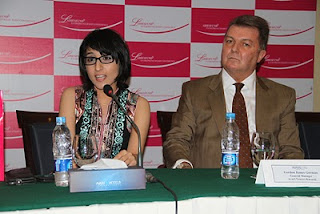Water Matters
Population growth: economy, agriculture and energy
By Puruesh Chaudhary
According to the Water Security Risk Index, released by Maplecroft, Pakistan has the least secure supplies of water and is in the extreme risk category.
The world’s sixth most and second most populous Muslim country; Pakistan’s population is projected to swell up to over 330 million in year 2050, as indicated by the population Division of the Department of Economic and Social Affairs of the United Nations Secretariat.
Today, as the country faces unprecedented security threats, dwindling economy, natural hazards and political instability; many analysts still believe that the country has promising market opportunities in future. The availability of water will become a much higher priority in business decisions and investment endeavours.
One of the country’s most urgent challenges is how to manage the nation’s precious water resources to meet growing human, economic, and environmental needs. The availability of clean water has dropped from 1950s: 5,000 cubic meters to less than 1,500 cubic meters per person today, primarily due to the rapid growth in population. And yet we remain dependent on only three hydrological units, two of which are rapidly silting from the Himalayas.
As the population increases the pressure on the existing water resources will intensify. The shift will have an adverse impact on employment, economic development, healthcare systems, food security, urban management, chronic diseases, biodiversity, communal and social harmony etc.
Pakistan has already been through two of the gravest natural hazards this year so far: the Attabad crisis and the recent floods. Causes: glacial melt and for the latter the debate is still among the monsoon patterns, heavy rainfall, climate change, dams and deforestation. Whichever case it is, as of now 20 million people are homeless and lives have been lost, as desperation and hunger persists.
It has been estimated by resource experts that continued growth in population will reduce per-capita freshwater availability by 70 per cent by 2070 and Pakistan will be a water scarce society. The increase in demand for water will adversely affect the groundwater resources, as over 70 per cent of it is allocated already to Pakistan’s irrigation and other agricultural needs; one million tube wells across the country are satisfying short-term needs but leading to unsustainable use of groundwater and declining water levels. This cannot continue.
The Water and Power Development Authority (Wapda) has recently recommended to the government to create water regulatory authority, which will consist of representatives from the federal and provincial governments. The purpose of the authority is to regulate optimum water use and balance in different basins under enabling legislation.
According to studies conducted on water management, Pakistan also loses almost two-thirds of its supply to leaks and poor transmission in its canal system due to poor infrastructure and inefficient water management.
Inter-provincial conflicts over water also complicate water management: the construction of large dams or other infrastructure is slow and costly and can take up to 10 years; many fear that new needed dams will not be built quickly enough to reduce water problems anytime soon.
In an online interview, President, Pacific Institute and Member US Academy of Sciences, Dr. Peter H. Gleick said that there is a need for building appropriate water-infrastructure in Pakistan, while also protecting downstream usage and rights on sharing. He says the relevant political institutions have a crucial role to play in effectively managing the possible internal conflicts arising out of water-sharing; but most of all, to eradicate the imbalance from within the society authorities will need to focus on providing people access to clean drinking water and proper sanitation.
According to the United Nations Secretary-General, Ban Ki-Moon “As the global economy grows, so will its thirst. This is not an issue of rich or poor, north or south. All regions are experiencing the problem of water stress. There is still enough water for all of us – but only so long as we keep it clean, use it more wisely and share it fairly. Governments must engage and lead, and the private sector also has a role to play in this effort.”
In contrast to the technical approach, the government will need to bring a more focused media attention in addressing and covering matters related to attaining the required benchmark for water conservation and management. An effort that engages media, public-private sector, academia and the non-governmental organisations focused on raising awareness within Pakistani society of water’s value and the need to place a price on its usage. This platform along with a variety of interventions will build a national dialogue on water, enabling multiple stakeholders in effectively creating content, most relevant to the Pakistani society.
One of the country’s targets in achieving Millennium Development Goals (MDGs) is to halve the proportion of people without sustainable access to safe drinking water by 2015. However, it is believed that Pakistan is far from achieving this target. The members of the United Nations are meeting this month in New York to discuss the progress on MDGs at the 65th UN Summit













































